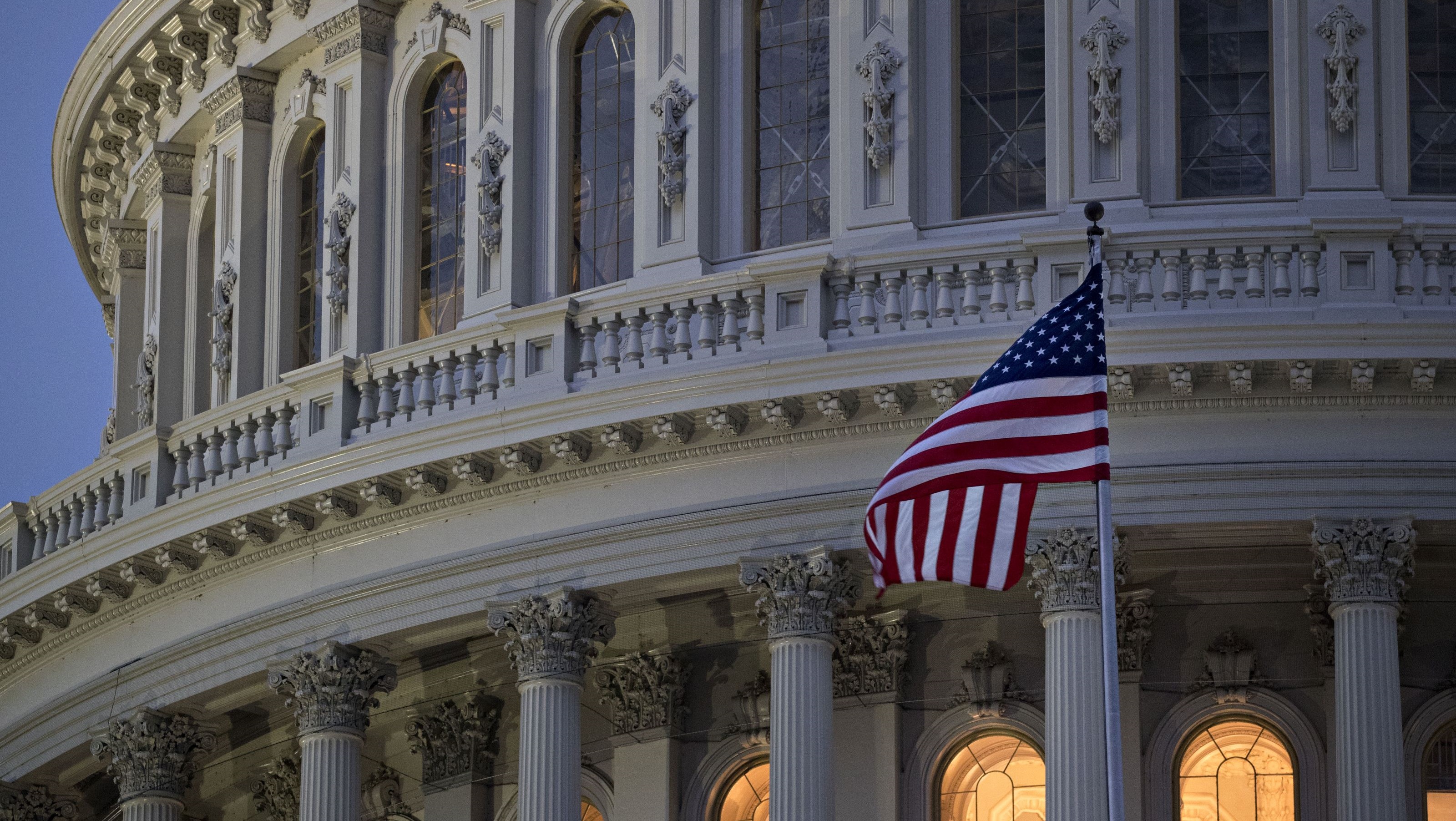Democrats and Republicans Battle to Reauthorize Appropriations Bills: Kiplinger Economic Forecasts
More than a dozen annual appropriations bills needing to be passed.


Profit and prosper with the best of Kiplinger's advice on investing, taxes, retirement, personal finance and much more. Delivered daily. Enter your email in the box and click Sign Me Up.
You are now subscribed
Your newsletter sign-up was successful
Want to add more newsletters?

Delivered daily
Kiplinger Today
Profit and prosper with the best of Kiplinger's advice on investing, taxes, retirement, personal finance and much more delivered daily. Smart money moves start here.

Sent five days a week
Kiplinger A Step Ahead
Get practical help to make better financial decisions in your everyday life, from spending to savings on top deals.

Delivered daily
Kiplinger Closing Bell
Get today's biggest financial and investing headlines delivered to your inbox every day the U.S. stock market is open.

Sent twice a week
Kiplinger Adviser Intel
Financial pros across the country share best practices and fresh tactics to preserve and grow your wealth.

Delivered weekly
Kiplinger Tax Tips
Trim your federal and state tax bills with practical tax-planning and tax-cutting strategies.

Sent twice a week
Kiplinger Retirement Tips
Your twice-a-week guide to planning and enjoying a financially secure and richly rewarding retirement

Sent bimonthly.
Kiplinger Adviser Angle
Insights for advisers, wealth managers and other financial professionals.

Sent twice a week
Kiplinger Investing Weekly
Your twice-a-week roundup of promising stocks, funds, companies and industries you should consider, ones you should avoid, and why.

Sent weekly for six weeks
Kiplinger Invest for Retirement
Your step-by-step six-part series on how to invest for retirement, from devising a successful strategy to exactly which investments to choose.
The U.S. Congress faces multiple spending battles leading up to the fall. To help you understand what is going on and what we expect to happen in the future, our highly-experienced Kiplinger Letter team will keep you abreast of the latest developments and forecasts (Get a free issue of The Kiplinger Letter or subscribe). You'll get all the latest news first by subscribing, but we will publish many (but not all) of the forecasts a few days afterward online. Here’s the latest...
Congress must pass all 12 annual appropriations bills, which lawmakers have not done since the 1990s, to avoid an automatic 1% cut to discretionary spending. Should this happen, how the cuts are implemented will be up to House and Senate appropriators, who will then need to compete for a smaller pool of money. Figure on especially intense fights over funding for the Department of Justice, the FBI, the IRS, and Customs and Border Protection.
Don’t be surprised if lawmakers resort to emergency spending packages for things like natural disaster relief and defense funding, especially military aid for Ukraine. The additional money would not count against the spending caps, so long as it’s reserved for “emergency” purposes. While Democrats are united in support of this strategy, Republicans are divided on circumventing the caps.
From just $107.88 $24.99 for Kiplinger Personal Finance
Become a smarter, better informed investor. Subscribe from just $107.88 $24.99, plus get up to 4 Special Issues

Sign up for Kiplinger’s Free Newsletters
Profit and prosper with the best of expert advice on investing, taxes, retirement, personal finance and more - straight to your e-mail.
Profit and prosper with the best of expert advice - straight to your e-mail.
Meanwhile, lawmakers face several other looming legislative deadlines:
- The monster five-year farm bill, which covers everything from crop subsidies and insurance to agricultural research and the food stamp program. Historically, the farm bill has been a bipartisan affair, but fights over work requirements for food stamp recipients and other factors have made passage this year more difficult.
- Federal Aviation Administration reauthorization, also a five-year bill. Democrats are pushing to eliminate airline “junk fees,” such as baggage fees and extra charges for changing and canceling flights. They are also advocating for a bill of rights for passengers that would provide better compensation for delays and cancellations. But it’s unclear whether they can get enough Republicans on board with these ideas.
- The Pandemic and All-Hazards Preparedness and Advancing Innovation Act, first passed in 2019 and now up for renewal. Intended to promote medical emergency and response capabilities, the measure will be subject to increased scrutiny by Republicans, who want to limit some activities of federal health agencies.
- The Coast Guard Authorization Act, which authorizes funding and policy for the Coast Guard, one of the nation’s six armed forces. This one is expected to be a fairly easy lift for lawmakers, but unforeseen issues could still crop up.
This forecast first appeared in The Kiplinger Letter, which has been running since 1923 and is a collection of concise weekly forecasts on business and economic trends, as well as what to expect from Washington, to help you understand what’s coming up to make the most of your investments and your money. Subscribe to The Kiplinger Letter.
Profit and prosper with the best of Kiplinger's advice on investing, taxes, retirement, personal finance and much more. Delivered daily. Enter your email in the box and click Sign Me Up.

Sean Lengell covers Congress and government policy for The Kiplinger Letter. Before joining Kiplinger in January 2017 he served as a congressional reporter for eight years with the Washington Examiner and the Washington Times. He previously covered local news for the Tampa (Fla.) Tribune. A native of northern Illinois who spent much of his youth in St. Petersburg, Fla., he holds a bachelor's degree in English from Marquette University.
-
 Nasdaq Leads a Rocky Risk-On Rally: Stock Market Today
Nasdaq Leads a Rocky Risk-On Rally: Stock Market TodayAnother worrying bout of late-session weakness couldn't take down the main equity indexes on Wednesday.
-
 Quiz: Do You Know How to Avoid the "Medigap Trap?"
Quiz: Do You Know How to Avoid the "Medigap Trap?"Quiz Test your basic knowledge of the "Medigap Trap" in our quick quiz.
-
 5 Top Tax-Efficient Mutual Funds for Smarter Investing
5 Top Tax-Efficient Mutual Funds for Smarter InvestingMutual funds are many things, but "tax-friendly" usually isn't one of them. These are the exceptions.
-
 Trump Reshapes Foreign Policy
Trump Reshapes Foreign PolicyThe Kiplinger Letter The President starts the new year by putting allies and adversaries on notice.
-
 Congress Set for Busy Winter
Congress Set for Busy WinterThe Kiplinger Letter The Letter editors review the bills Congress will decide on this year. The government funding bill is paramount, but other issues vie for lawmakers’ attention.
-
 The Kiplinger Letter's 10 Forecasts for 2026
The Kiplinger Letter's 10 Forecasts for 2026The Kiplinger Letter Here are some of the biggest events and trends in economics, politics and tech that will shape the new year.
-
 Special Report: The Future of American Politics
Special Report: The Future of American PoliticsThe Kiplinger Letter Kiplinger assesses the political trends and challenges that will define the next decade.
-
 What Services Are Open During the Government Shutdown?
What Services Are Open During the Government Shutdown?The Kiplinger Letter As the shutdown drags on, many basic federal services will increasingly be affected.
-
 Banks Are Sounding the Alarm About Stablecoins
Banks Are Sounding the Alarm About StablecoinsThe Kiplinger Letter The banking industry says stablecoins could have a negative impact on lending.
-
 Trump's Economic Intervention
Trump's Economic InterventionThe Kiplinger Letter What to Make of Washington's Increasingly Hands-On Approach to Big Business
-
 What is AI Worth to the Economy?
What is AI Worth to the Economy?The Letter Spending on AI is already boosting GDP, but will the massive outlays being poured into the technology deliver faster economic growth in the long run?